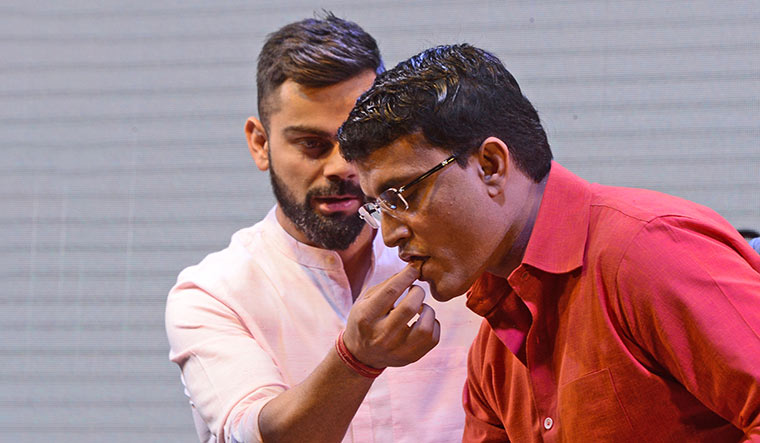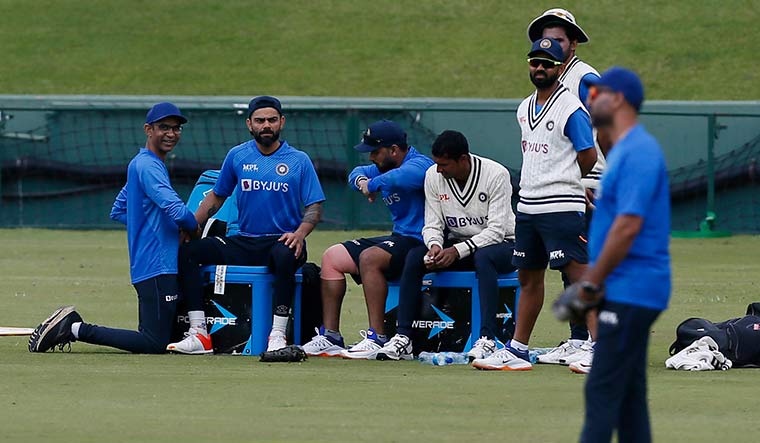It seems like an enviable life. A chartered flight from Mumbai to Johannesburg via the Seychelles. Security escort on landing. A welcome with much pomp at a luxurious, scenic hotel that is closed to other guests. However, for those on the road—the Men in Blue—it is another tour in a bio-bubble. The first training session at SuperSport Park, Centurion, is under overcast conditions. The bowlers smile—it is good weather for bowling; the batters, not so much.
It is new Team India head coach Rahul Dravid’s first series abroad. Who knows better than him what it takes to master the challenges of playing away. His message ahead of the session is: “Quality practice, good intensity”. Test skipper Virat Kohli listens, nods and claps, and it is time to train for what lies ahead. A Test series against hosts South Africa and the possibility of recording India’s first ever Test series win there.
India, runners-up in the inaugural World Test Championship (WTC), leads the points table of the new WTC cycle with 42 points (three wins, two draws and one loss in 2021). According to Kohli, it was the South Africa tour in 2018 that started Team India’s surge to become one of the best Test teams in the world. (India won the final Test of the series, after losing the first two.) “South Africa was really the start for us as a team, travelling and starting to believe we can win a series overseas,” he said in his pre-departure news conference on December 15. “We built it up nicely in England, and Australia was an accumulation of all those efforts.”
Mastering the conditions will be key in this series. Pace and bounce are going to be the staple diet in Centurion and Johannesburg, with Cape Town having something to offer to the spinners. Dravid had led India to a historic Test win in Johannesburg in 2006, before Kohli repeated the feat in 2018.
For South Africa, this will be their first series of WTC 2021-23. They finished fifth in the last edition. This will be their first series at home led by Dean Elgar, who became captain in June 2021 when the team toured the West Indies. The series is also the first outing for the Proteas since then. Unfortunately, the threat of the Omicron variant of Covid-19 means that it will be played behind closed doors.
The series is also happening in the shadow of a damning report by the social justice and nation building ombudsman Dumisa Ntsebeza, on racial discrimination in South African cricket. The report said that former stars Graeme Smith, Mark Boucher and AB de Villers were guilty of prejudicial conduct. Boucher is the current head coach; Smith is now Cricket South Africa’s director of cricket.
India, too, has had its share of troubles. The absences of Rohit Sharma, because of a recurring hamstring injury, and all-rounder Ravindra Jadeja are setbacks. But, this is overshadowed by the tensions between Kohli and the BCCI, led by former skipper Sourav Ganguly. It started in September, when Kohli said he would relinquish T20I captaincy, citing workload. The announcement came as a surprise to many in Indian cricket. Though Ganguly and BCCI secretary Jay Shah both issued statements that seemed supportive of Kohli, Sharma was made captain for both T20Is and ODIs. Kohli, it is reliably learnt, had assumed that he would be allowed to continue as ODI captain.
There is a gulf between Kohli’s version of events and Ganguly’s. And the truth lies somewhere in between. Kohli was reportedly advised to rethink his decision by Ganguly, and even former head coach Ravi Shastri, during India’s tour of England (June-September, 2021). But, he had made up his mind. Kohli was then advised not to announce this decision till after the T20I World Cup (October-November), but he did not listen. This clearly made the BCCI bosses unhappy.
On December 8, the BCCI announced the Test squad for the South Africa series. In the same press release, as a footnote, it said: “The selection committee also decided to name Mr Rohit Sharma as the captain for the ODI and T20I teams going forward.” There was no quote or explanation from Chetan Sharma, the chairman of selectors.
As conspiracy theories exploded in the media and social media, Ganguly issued a statement the next day, explaining that while the board did not want Kohli to quit T20I captaincy, once he decided to do so, the selectors felt there cannot be two white ball captains. “That is too much leadership,” said Ganguly, adding that he had spoken to Kohli personally and that Chetan Sharma also spoke to him regarding the decision.
That seems fair. But, according to Kohli, there was not too much dialogue. At the news conference on December 15, Kohli said he was informed he would no longer be ODI captain an hour-and-a-half before the Test squad was announced on December 8. He also said that there had been no communication from the BCCI regarding the ODI captaincy between September 16, when he said he would step down as T20I captain, and December 8. “The chief selector discussed the Test team with me; once we both agreed, before ending the call, I was told that the five selectors have decided that I will not be ODI captain, to which I replied, ‘Okay, fine’,” said Kohli. “And we chatted about it briefly in the selection call afterwards.”
Kohli strongly rebutted rumours of a rift between himself and Rohit Sharma. He also contradicted Ganguly’s claim that the board did not want him to quit the T20 captaincy. “When I approached the BCCI about my decision, it was received well,” he said. “There was no offence taken and no hesitation from the BCCI. I was told it was a progressive step. At the time, I told them I would like to continue [captaining] in Tests and ODIs.”
As per THE WEEK’s findings, the following things are clear. After Kohli announced he would be stepping down as T20I captain, there was no communication between him and the BCCI till the Test squad selection. Ganguly and Shah did advise Kohli not to step down, and if he was going to quit, not to announce it till the T20I World Cup was over.
Former captain Sunil Gavaskar played down the alleged gap in communication. “What is the controversy here?” he told a news channel. “As long as the chairman of selectors told him that he was not being considered for ODI captaincy now, that is perfectly fine. It is the selectors who have authority in selection committee meetings. The captain is just a co-opted, non-voting member.” He added that as long as Kohli did not find out from the media, or, “as it has transpired in the past, the captain of a passenger flight announced it”, it was absolutely okay.
Former skipper Kapil Dev, meanwhile, advised the team to focus on the South Africa series. “I would say the board president is the board president, but, yes, the Indian cricket team captain is also a big thing,” said Dev, who had run-ins with BCCI bosses during his playing days. “But, talking badly about each other in public, I do not think is a good thing, whether it is Sourav or Kohli.”
Kohli’s sacking as white ball captain, which has dashed his hopes of leading India in the 2023 ICC Men’s ODI World Cup in India, is also being seen as a “clipping of his wings”. It is no secret that Kohli had absolute control of the team and was backed by Shastri, especially in the last two to three years. In fact, there have been occasions when even Shastri had not been able to prevail over Kohli when it came to decisions about the team.
There is also an allegation of “inaccessibility” against Kohli. Selectors and BCCI mandarins have reportedly found it difficult to talk to Kohli. There have also been issues, reportedly, where the selectors and Kohli have not been on the same page and certain players have not been given a chance by Kohli, leaving the selectors frustrated. The growing differences between Kohli and the BCCI hierarchy could well have resulted in events unfolding the way they did.
There have been murmurs of a show-cause notice against Kohli, presumably for his comments regarding the lack of communication, but it is unlikely to materialise, if at all, till the team returns from South Africa. Ganguly, a veteran on issues related to the captaincy and the BCCI, has sought to put a moratorium on the controversy for now with his comment that the board would “deal with it appropriately”.
Kohli, true to his Delhi-cricketer-identity, has remained unfazed so far. But, taking on the BCCI, especially Ganguly, will only increase the pressure on himself to deliver, both with the bat and as Test captain. Then again, a hungry and determined Kohli can only mean good news for Team India.
However, this controversy yet again highlights the need for transparency and clarity in how Indian cricket is run. These, along with the rest of the reforms initiated by the Supreme Court, have been sent to the attic by the BCCI.



